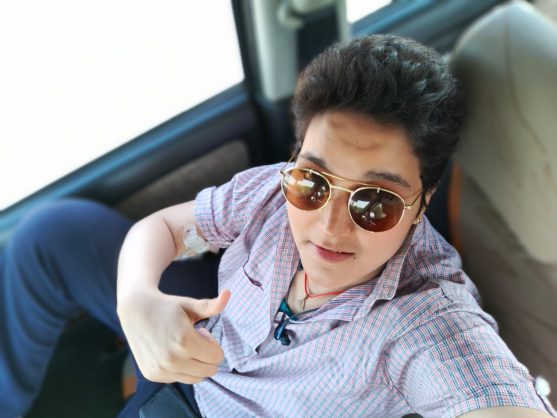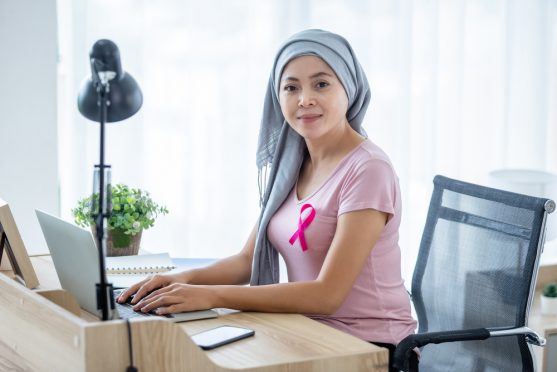At our latest cancer listening circle ‘Talk Your Heart Out’, we listened to Meenakshi Choudhary talk about the problems of a young cancer patient. Here are some excerpts from the session.
Meenakshi is not your everyday cancer patient. She runs her own YouTube channel called ‘Boombox IT is your channel’ where videos of cancer awareness can be found alongside videos of folk dance. She is full of excitement and a sense of adventure. Popularly known in her circle as ‘Motabhai’ (big brother), Meenakshi is outgoing and confident.

However, that is not to say her cancer journey has been easy. Diagnosed with leukemia in 2019, Meenakshi has also suffered from COVID-19 during the course of her treatment. Innumerable surgeries and blood transfusions have become a part of her life since then. The treatment has taken a toll on her emotionally as well as financially.
Meenakshi used to work as a trainee engineer for a Japanese manufacturing unit before cancer struck. She now finds herself without stable work and faced with long term cancer treatment. Her family has been more than supportive of her, including financially, but it is overwhelming for her family as well.
In our Talk Your Heart Out session, Meenakshi highlighted this problem faced by young cancer patients and survivors: lack of job opportunities. Many employers are not open to hiring a cancer patient as they assume it will mean long absences from work, and a declined ability to put in the hours and efforts required to fulfill their job responsibilities.
This problem is very pronounced in India, where funds for cancer patients are scarce and not easily accessible. NGOs like Indian Cancer Society are working to provide employment opportunities to cancer survivors but such jobs are few when compared to the number of cancer patients and survivors who need employment.
Here we look at a few important points in this discussion around finding a job after cancer.
-
Are there any jobs reserved for cancer patients and survivors?
In the Indian context, the simple answer is no.
The employment laws that protect disabled individuals are not extended to cancer survivors or patients. So, as a cancer survivor or patient, you are applying to the same jobs that everyone else can.
However, the other side of this coin is that you can have access to any job that you are qualified for. An employer cannot refuse you a job based solely on your medical history.
To take this one step further, you do not need to inform prospective employers that you are a cancer survivor. As long as you can put in the hours and the work expected of you, there is no reason to disclose this information.
-
Do cancer survivors normally return to work immediately after treatment?
Yes, cancer survivors who have successfully completed treatment can return to work, depending on their overall health. Your oncologist will advise you on follow-up visits, any medication to be continued and any other lifestyle changes that you need to follow to remain healthy.
Onco.com’s community has several survivors who returned to work after their treatment. Extreme caution may need to be followed at work to minimise exposure to viruses.
Shreshtha Mittal, a stage III breast cancer survivor, continued working through most of her cancer treatment. Her employers allowed her work from home facilities and flexible working hours to accommodate her chemotherapy and radiation schedules.
She later quit her job to become a fulltime cancer coach. She continues to take care of her toddler son and her health through this career change.

-
What if my job is no longer suitable for me after cancer?
If you have a job that requires constant travel, or increases your risk of infection in other ways, you may need to consider other work opportunities. Some jobs may require more physical strength and skill than you can now manage. You may also find your old job more stressful now and may want to opt for less strenuous options.
Based on your qualifications and your skill set, you may need to look for options that allow you to work at your pace, while providing a safe work environment. Work from home jobs are often preferred by cancer survivors.
Your human resource manager or your line manager may be able to advise you on what exceptions can be allowed owing to your present medical condition. Extra leave allowances and flexible shifts could be part of such an understanding that you reach with them.
One of our Onco Warriors, Amit Dubey, was in the army when he was diagnosed with cancer. Post-treatment, he decided to switch to a career in hospitality. This move turned out to be a very successful one for him. Even though he misses his life in the army, he continues to enjoy an interesting and fulfilling career.
-
What if I don’t find a job after cancer?
It’s not uncommon to feel anxious over finding a job. Even those who have not been affected by cancer do experience this feeling often.
To help you feel more confident, make a plan for finding a new job. You can include information on which job portals, websites, or personal contacts can be useful for this. Speak to others who share your qualifications and skill set, to find out how they went about finding a job.
If you feel overwhelming stress about this, speak to a counsellor who can guide you through this process.
You can speak to other cancer survivors and patients about problems that you are encountering in your cancer journey. Join our Facebook group to receive information about our next listening circle.

